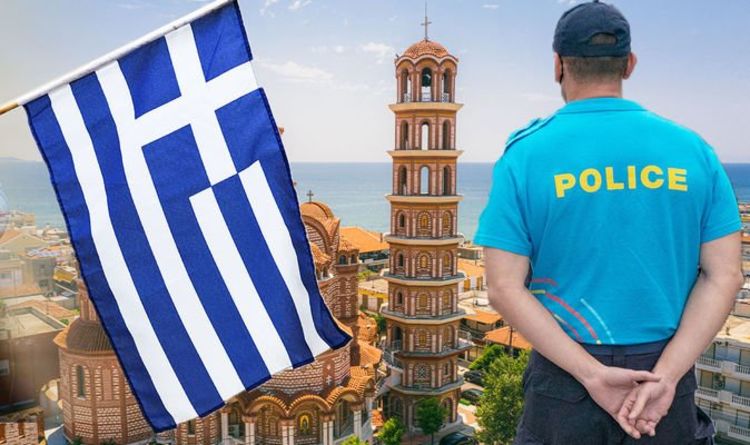Greece enforces ‘partial lockdown’ in 8 northern spots – which areas face restrictions?
Simon Calder says current UK travel rules are a ‘mess’
We use your sign-up to provide content in ways you’ve consented to and to improve our understanding of you. This may include adverts from us and 3rd parties based on our understanding. You can unsubscribe at any time. More info
Greece has put in place a series of “partial lockdowns” across certain hotspots in the north of the country due to the ongoing coronavirus pandemic. The nation has routinely put in place and later lifted such restrictions during the pandemic when figures have begun to rise, or hospital levels have hit concerning levels.
Greece is currently on the UK’s amber list for travel, which means fully vaccinated Britons can visit the country without having to quarantine on their return home.
However, following the latest restrictions, the Foreign, Commonwealth and Development Office (FCDO) has issued an updated warning for those on holiday or planning a trip in the coming days.
The areas currently impacted by the new tighter restrictions include Thessaloniki, Chalkidiki, Larissa, Kilkis, Kavala, Imathia, Pieria, Pella, Kastoria, Xanthi and Drama.

What are the “partial lockdown” restrictions and how long will they last?
According to the FCDO update, the current restrictions will last until October 8, 2021, at the earliest.
At this point, Greek authorities will review the need for these rules.
The FCDO explains: “A partial lockdown is in force in most of Northern Greece, including Thessaloniki, Chalkidiki, Larissa, Kilkis, Kavala, Imathia, Pieria, Pella, Kastoria, Xanthi and Drama until at least 8 October.
“Restrictions include a curfew between 1am and 6am, and a ban on playing music at entertainment venues.
“Check the latest local guidance and follow the advice of local authorities.”
It adds: “All restrictions remain under regular review.
“In Regional Units where the spread of COVID-19 is particularly high and hospital capacity is limited, restrictions may be tighter or re-imposed with limited notice.”
For those who are travelling to Greece, the FCDO notes that it only includes “the most relevant measures to travellers”, therefore it is advised people check the specific rules of their destination before travelling.
DON’T MISS
Portugal holidays: What are the latest travel rules for Britons? [FCDO ADVICE]
A safari tent stay in the New Forest at Green Hill Farm [REVIEW]
Passport rules: Three things Britons must check before Europe travel [WARNING]
Is it still safe to visit these regions during “partial lockdown”?
Although restrictive measures are in place, when such rules were imposed in other regions throughout the summer months experts said it is still safe for tourists to visit Greece.
Earlier in the summer, Crete faced a similar “partial lockdown”.
At this time, managing director of Greece tour operator Sunvil, Chris Wright, spoke with Express.co.uk to explain why it is still safe to plan a holiday and share his advice for booking.
Mr Wright pointed out the lockdown measures are far from full lockdown restrictions and noted: “The ‘lockdown’ is in fact a curfew in place from 1am to 6am”.

He explained: “This means that by-in-large most travellers will be unaffected. Life continues as normal, with safety measures in place as per the rest of the country.
“All of our guests that travelled in June had a wonderful time and didn’t notice any difference. Whilst the restrictions may affect those that want to party the night away in music bars, our guests are more at home in tavernas and quieter bars at which they see no difference.
“They have actually commented that it is better as you don’t have to talk over music.”
However, it is vital Britons always purchase an all-encompassing travel insurance policy when booking their holiday in order to protect against unexpected changes or disruptions.
As the FCDO is not advising against “non-essential travel” to Greece, travel insurance policies remain valid.
See the latest Covid vaccine stats below and visit InYourArea for all the Covid vaccine latest
What other restrictions are in place across Greece?
A number of COVID-19 restrictions remain in place across the entire nation, however, there are some regional variations so it is important to check the local rules of your destination before travelling.
According to the FCDO: “Proof of vaccination is required to enter indoor public spaces such as restaurants and museums.”
The travel authority states: “You should be prepared to demonstrate your proof of vaccination when asked.”
Unvaccinated travellers “will not be allowed to participate in sports, or enter stadiums” and “must present a negative rapid test, taken up to 48 hours before entry, to visit closed public spaces including restaurants, nightclubs, bars, cinemas, theatres, museums, and archaeological sites
You must use a facemask in all indoor public and communal spaces, including work-places and on public transport.”
There are currently restricted numbers in place for churches and religious services.
Rules are also in place when using transport.
The FCDO explains: “Restricted numbers are in place for churches and religious services.
“Unless all passengers are members of the same family, a maximum of three persons are permitted to travel in a taxi or other private vehicle with up to seven seats, or four persons in a private vehicle with up to nine seats.”
Source: Read Full Article



